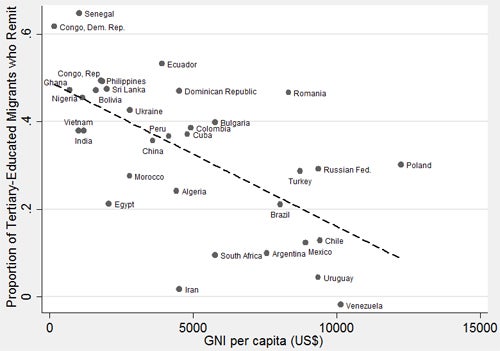Brain drain worries policymakers around the world. For example, a search today in Google News gives a host of stories in the past month alone concerning efforts by universities in Vietnam to stop brain drain, demands for wage increases to stop the brain drain of doctors in Pakistan, claims that Malaysia’s brain drain hinders its economic progress, efforts to stem brain drain in Jamaica, a plea to “stop the brain drain” in Cyprus, and even fears of massive brain drain from the state of New York.
But does high-skilled emigration really pose such a threat? The last five years has seen a surge in empirical research on the subject, which John Gibson and I use to answer eight key questions about brain drain in a paper forthcoming in the Journal of Economic Perspectives and now out in the World Bank working paper series.
The 8 key questions addressed are: 1) What is brain drain? 2) Why should economists care about it? 3) Is brain drain increasing? 4) Is there a positive relationship between skilled and unskilled migration? 5) What makes brain drain more likely? 6) Does brain gain exist? 7) Do high-skilled workers remit, invest, and share knowledge back home? and 8) What do we know about the fiscal and production externalities of brain drain?
Some key findings:
- Brain drain is mostly not about doctors and nurses – scientists, engineers, IT professionals, and academics are the most common occupations, while health professionals only account for 5-15% of high skilled immigrants in some key destination countries. Moreover, the rate of emigration actually is lower for doctors in most developing countries than it is for the average tertiary educated individual. And contrary to popular discussion, hardly any PhDs are taxi drivers!
- Although brain drain has been increasing in absolute terms, the rate of high-skilled emigration has been flat over the 1975-2000 period and likely fell over the past decade. The reason is that tertiary enrolment rates have grown at a faster rate than emigration in most developing countries.
- Skilled migration and unskilled migration seem to go hand in hand: So the idea that countries can stem high-skilled emigration while promoting more opportunities for less-skilled individuals to migrate does not meet the empirical reality.
- Existing empirical evidence on “brain gain” shows the incentive to migrate does increase education at upper secondary and perhaps lower tertiary levels – but evidence is much less clear for higher skilled professions. One key factor is how free supply of education is to respond to demand – so Government limitations on private education and restrictions on the number of University places available for doctors, engineers, and other professionals will reduce the likelihood of brain gain.
- And finally, for our finance readers – there has been much debate about whether the high-skilled actually remit or not. Recent micro data shows the high-skilled do remit, especially when they come from poor countries (see Figure):

Recent evidence should counteract many of the myths and common concerns about brain drain. Brain drain rates are not skyrocketing. Africa is not the most affected region for brain drain; small island states are. Skilled migrants enjoy massive increases in their living standards as a result of emigrating, and skilled migrants end up remitting back as much as the fiscal cost of their absence.
Ultimately then, given the massive individual gains from migration, any belief that brain drain is detrimental for development must rely on large externalities of high-skilled individuals. This is the area where the existing empirical literature is weakest, but the estimates that do exist suggest that the production externalities of brain drain (at the margin at least) are quite small.
The paper suggests then that worries about brain drain are likely to be overblown, but also that there are still large knowledge gaps on certain impacts, and almost no rigorous evidence as to the impacts of policy actions in this area. Given how prevalent brain drain concerns are, there seems to be plenty of fruitful avenues for future research and policy experimentation going forward – with the paper ending with some ideas on directions for these.


Join the Conversation